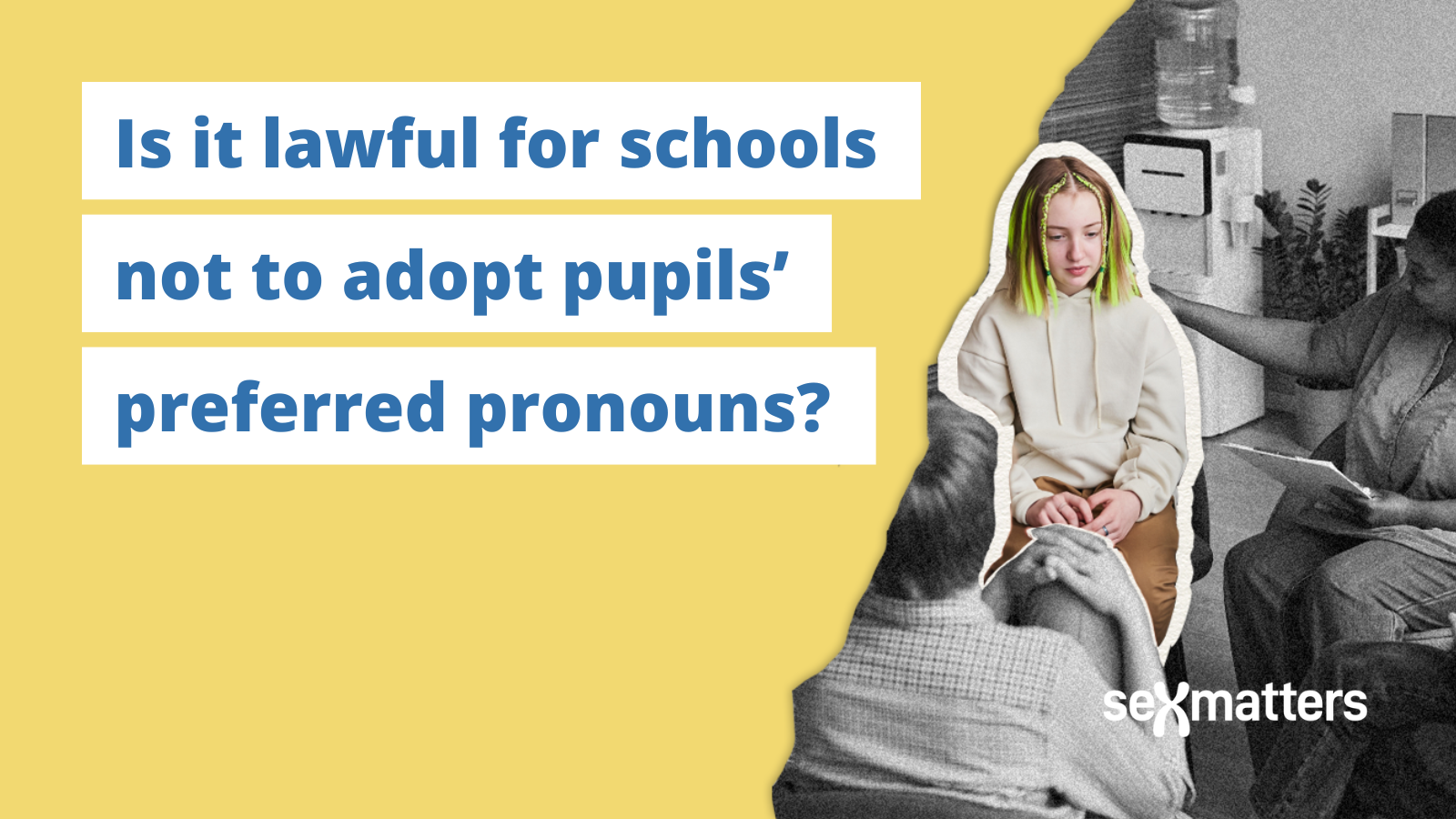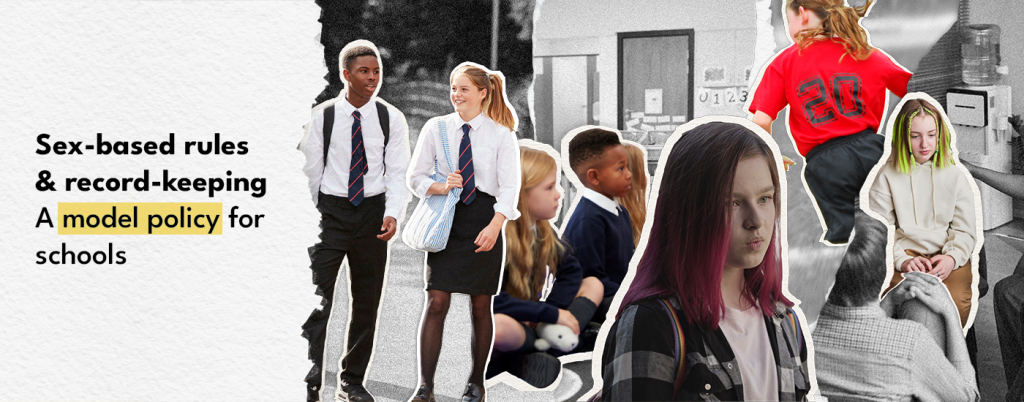What about pronouns at school?

Sex Matters has published a model policy for schools to help them communicate clear expectations to staff, pupils and parents and let them respond lawfully and safely to children who are “gender questioning”. We are calling on the Department for Education to provide a similarly clear policy for schools to adopt with the confidence of government backing.
Our model policy largely aligns with the legal analysis produced by Karon Monaghan KC and the draft guidance produced by the Department for Education: schools should be clear that pupils are not allowed to use opposite-sex facilities, compete in opposite-sex sports, or attend opposite-sex RSHE or PSHE lessons – or to be admitted to a single-sex school on the basis of their “gender identity”. This is increasingly uncontroversial as a legal analysis, and it is expected that the government will finalise its guidance soon.
But the question of “pronouns” is often seen as more of a grey area, and one where there may be legal challenges. While pupils may of course experiment with alternative pronouns in their friendship groups, the question is whether the school should require staff to use a pupil’s preferred pronouns and enforce a requirement for other pupils to use them too.
The draft DfE guidance says this should be rare, but it may happen:
“Agreeing to a child’s request to have others use different pronouns about them is a significant decision. Primary school aged children should not have different pronouns to their sex-based pronouns used about them.
“For older children, schools do not need to specify pronouns to be used about each pupil and can decline a request to change a child’s pronouns… schools and colleges should only agree to a change of pronouns if they are confident that the benefit to the individual child outweighs the impact on the school community. It is expected that there will be very few occasions in which a school or college will be able to agree to a change of pronouns.”
Gender-ideology activist organisations say that this must be a matter of routine. They argue that the approach of the DfE’s draft guidance is unlawful.
Stonewall says:
“Not using a trans pupil’s chosen pronouns (no matter their age) could be considered discrimination or harassment under the Equality Act 2010 as noted in the example on page 65 of the EHRC’s Technical Guidance for Schools in England.”
Mermaids says that not allowing primary-age children to “change their pronouns” is egregious and that:
“Refusing to use new pronouns for a student could amount to unlawful discrimination if the trans student is treated less favourably because they are trans (e.g. consistently and intentionally being misgendered).
“A blanket policy on primary students’ inability to change their pronouns is likely to be unlawful discrimination. The guidance must therefore be amended to enable pronoun changes at all ages, and advise schools of the legal risks they face if they institute blanket policies to refuse pronoun changes.”
Our model policy does not present pronouns as a matter for negotiation at all. It deals with them as part of a coherent system of communication, along with other words like male/female and boy/girl.
The model policy explains:
“Rules, routines and behavioural expectations are set out both in written policies and statements and in verbal instructions issued by teachers and other staff. We use consistent, clear sex-based language (boy/girl, male/female, he/she) in order to communicate expectations to all pupils, in line with our behaviour policy.”
And:
“We will not consider requests to wear opposite-sex uniform, use opposite-sex toilets, showers or changing rooms, or participate in opposite-sex sports and other separate lessons, or for a pupil to be referred to by staff with opposite-sex language, since any of these will encourage the expectation that the status of the child’s sex, and requirement to follow sex-based rules, have changed or will change during their school career.”
Is it lawful for schools not to adopt pupils’ preferred pronouns?
As Karon Monaghan sets out in her advice on the Brighton & Hove toolkit, the legal question is about indirect discrimination. Indirect discrimination is defined by Section 19 of the Equality Act:
(1) A person (A) discriminates against another (B) if A applies to B a provision, criterion or practice which is discriminatory in relation to a relevant protected characteristic of B’s.
(2) For the purposes of subsection (1), a provision, criterion or practice is discriminatory in relation to a relevant protected characteristic of B’s if—
- A applies, or would apply, it to persons with whom B does not share the characteristic,
- it puts, or would put, persons with whom B shares the characteristic at a particular disadvantage when compared with persons with whom B does not share it,
- it puts, or would put, B at that disadvantage,
- and A cannot show it to be a proportionate means of achieving a legitimate aim.
That is, schools are allowed to have rules, but if those rules disadvantage pupils with particular protected characteristics, the school must be able to justify them as “a proportionate means of achieving a legitimate aim”.
Monaghan says that compelling a teacher, a member of staff or another child to use a child’s chosen pronouns “may be uncomfortable, confusing and sometimes offensive” but that this must be balanced against the risk that “a persistent failure to use chosen pronouns may indirectly discriminate against trans identified children under the EqA and the Convention rights… in some circumstances”.
She concludes that the question is more finely balanced than in the examples such as toilets, changing rooms and residential accommodation where the direct harm to others is clearer; it could go either way depending on the circumstances. She says that a school that has adopted a child’s preferred pronouns and has a “no misgendering rule” may find it relatively easy to overcome the hurdle of establishing that there is a legitimate aim for the practice (“trans inclusion”) which would justify the rule and overcome a gender-critical discrimination claim by a teacher.
On the same day that Monaghan completed her advice, a judgment was delivered by an employment tribunal that supported her analysis. The case of Kevin Lister v Swindon New College concerns a maths teacher at an further-education college who had been dismissed after complaints that he refused to use a trans-identifying A-level student’s chosen name or preferred pronouns and instead “adopted a gender neutral communication style by gesturing”. He also gave unwanted advice and talked about a family member who had attempted to take their own life through an incident of alcohol misuse. He told another student that transition was a “disaster situation” and that the student would “ruin her life”.
The school investigated the complaints, recognising the teacher’s right to hold and express gender-critical beliefs, but also the need to balance that against “the rights of trans-students to access education in an environment that was no less favourable than their peers and did not violate the[ir] dignity”. Lister’s claim of belief discrimination failed.
That Lister’s conduct was judged to be unprofessional and not in line with the college’s policy does not mean that schools must in general have policies of adopting preferred pronouns (and other non-sex-based language). It is up to schools and colleges to consider and develop their policies in light of safeguarding and other obligations.
A school that has adopted a standard policy of always using clear sex-based language would be able to argue that it has a legitimate aim (clear sex-based rules that support safeguarding and communicating expectations of behaviour). This could be used to overcome a gender-reassignment discrimination claim by a pupil unhappy that the school does not entertain pupils’ requests to be known by alternative pronouns.
It is important for schools to understand (particularly in the continuing absence of clear government guidance) that there is no risk-free option in relation to sex-based language. A policy of using clear sex-based language may be challenged as indirectly discriminating against children with the protected characteristic of gender reassignment, and defended on the basis that it is a proportionate means of achieving legitimate aims relating to safeguarding and the clarity of rules and communication. But the enforcement of a policy of requiring teachers and other pupils to use preferred pronouns is certainly an interference requiring justification in those individuals’ article 10 rights, and may also amount to direct discrimination on grounds of gender-critical belief or unjustifiable indirect discrimination on grounds of gender-critical or religious belief.
What a school should not do is leave expectations unclear, fail to think through how language and rules relate, and leave it to individual pupils and teachers to negotiate conflicts informally.
What does the EHRC’s technical guidance say?
Both Stonewall and Mermaids refer to the Equality and Human Rights Commission’s technical guidance on the Equality Act for schools to back up their argument that not adopting a child’s preferred pronouns is unlawful (they say it is direct discrimination). This is the example:
“A member of school staff repeatedly tells a transsexual pupil that ‘he’ should not dress like a girl and that ‘he’ looks silly, which causes the pupil great distress. This would not be covered by the harassment provisions, because it is related to gender reassignment, but could constitute direct discrimination on the grounds of gender reassignment.”
This vignette is not about “pronouns” but “unwanted conduct related to a protected characteristic”. The legal point it is illustrating is that harassment provisions relating to sexual orientation, gender reassignment and religion or belief in the Equality Act do not apply to pupils in school – but nevertheless unwanted conduct related to these characteristics resulting in a pupil suffering a disadvantage could be brought as a direct-discrimination claim.
As we have pointed out before, this example is unhelpful and vague and we hope it will be updated by the EHRC. Repeatedly ridiculing a pupil as looking silly could indeed be direct discrimination. But teachers will often have to explain rules to pupils that are “unwanted” by the child, but not detrimental.
It is necessary for teachers to use clear sex-based language and categories to explain and enforce rules such as “No boys in the girls changing rooms” or “That is not correct uniform; go home and change”. These rules may cause a child who wishes they were the opposite sex distress, but that is not direct discrimination.
The DfE should produce a model policy that makes this clear – not leave the situation ambiguous, to be battled over by individual teachers and pupils in the classroom.

